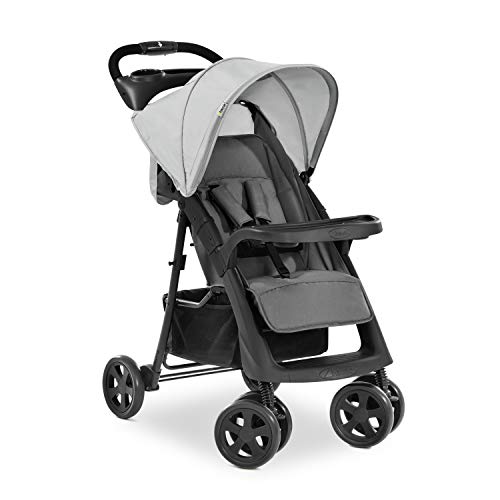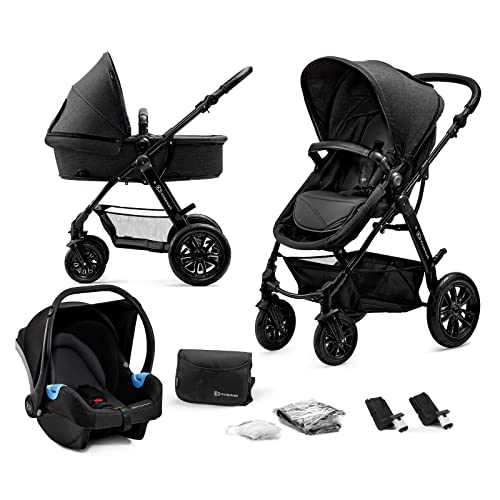Parent Facing Pram Tools To Ease Your Daily Life Parent Facing Pram Tr…
페이지 정보
작성자 Jaunita 날짜24-11-01 20:02 조회15회 댓글0건본문
 Monitor Your Little One's Wellbeing With a Parent Facing Pram
Monitor Your Little One's Wellbeing With a Parent Facing PramYou can easily monitor your child's wellbeing and comfort when they're snuggled in a pram that is positioned with the parent. This is particularly helpful during busy times.
A study conducted by the University of Dundee found babies in buggies that were face-to-face chatted twice as often, laughed more often and had lower heart rates, all of which indicate that they were less stressed.
Peace of Mind
A parent facing pram is a great way to ensure that your baby's safety is secure. They will be kept in a safe seat that is securely secured by the five-point harness. This will keep them safe from any accidents that might occur when out and about.
A high-quality pram will also have a large shopping basket to accommodate all your baby's necessities so that you don't need to think about where you can place all of the other items. It is also essential to have the right accessories to keep your child at ease on their journey. For instance the footmuff that is compatible with a five-point harness and a lining for your pram to shield from sun or rain.
It is important to test the pushchair before you buy it for your child. Models that have swivel wheels for easy maneuverability, and adjustable handlebars will make it easier for everyone in the family to operate.
A safety harness is vital for parents worried about their baby falling out of the buggy. It will prevent your child from being able to escape the seat. It's also great for keeping them in the event of an emergency.
It's important to note that some experts on babies recommend that babies should be around six months old before they can use a front-facing pram but this is due to the individual developmental milestones. Some babies are ready for the world more quickly and this is especially true if their curiosity and desire to discover the world is high.
Some parents may be concerned that their baby will develop a flat spot in the back of their head after being in a parent facing pram (Bookmarksbay link for more info) however this is not something to be concerned about. Auckland osteopath Julia Griffiths suggests that babies require a lot of time lying flat to strengthen their skull muscles. this is often accomplished using a car in a position that is affixed to the parent and being supervised during Tummy time.
Bonding Improved
If you've picked a pram with a carrycot or using a pushchair, the direction your baby is facing when out and about is something to consider. It might seem like a minor detail but it can have a huge impact on your child's development and interaction with you when out and out and about.
A new study has found that children in buggies with a side view are less likely to talk or interact with their parents as compared to those who use a pushchair with a parent-facing. The study tracked 2,722 children and their mothers in 60 towns as well as another more thorough study of 20 mothers and their infants. The results show that babies who sit in a front-facing pram with their parents are twice as likely to smile at each other than those who sit in an away-facing buggy. This is due to the fact that when your baby is able to interact and interact with you and interact with you, they are more enthused.
Babies can discover about the world around them, and looking at each other in the process encourages their development and attachment. It also enables you to explain things to them like buses and playgrounds, or flowers that they might not notice otherwise.
It is important to remember that your child must be able to sit on their own before you can convert it into a pushchair with the face forward. Children younger than this age may be unable to adjust to the change, and may be more upset when they are forced to change from a seated to standing position.
A medical professional can test your baby to ensure that they are prepared for the transition. They can check whether your child's bones and muscles are strong enough to handle the change, as well as whether they have developed hypersensitive spots. This test is particularly crucial if you've used your pushchair prior to your baby's birth, or if you've previously had an away-facing pram. A health professional can also help you determine if it's safe for your child take a seat in the pushchair facing forward.
Better Eye Contact
One of the best advantages of having a parent facing pram is the ability to look at your baby. This is particularly important for newborns and infants since they are learning about the world around them. It's also a chance for them to talk to them and play with them which helps them learn the names of the things they see and improves their language development.
Studies have shown that when babies are sitting in front of their parents, they're more likely to speak to them and laugh more than when they're away from them. This is because babies absorb sounds and images from their environment. They are able to comprehend what's happening around them. Eye contact can also make it easier for parents and their children to communicate. This helps to soothe the infant and allows him to relax.
Bring a travel toy along with your child to play with when they are in the pushchair. These toys are ideal for stimulating the mind and bringing smiles to children. They can also help your baby recognise your voice, which is crucial for their cognitive development.
Babies are always exploring the world and their surroundings. But, as they get older and more active, they may be able to sit forward in their pushchair. If this is the case, Best prams then it's worth thinking about purchasing a front-facing pushchair or triple stroller from our collection.
After a few months of the transition to a front-facing pushchair, it's recommended to put in a footmuff to keep your child warm and comfortable. Choose a design which can be removed and put back as required and is compatible with the car seat or cot of your baby. It's also a good idea to buy an item with a distinct design that will let your child recognize their pram when out and about.
The process of checking your baby's neck and head alignment is an excellent way to be sure that their posture for pushing is correct. If the front of the pushchair tilts upwards, their head and neck are being pushed against it. This isn't safe.
Easier Monitoring
The comforting sight of your baby's face when they are in a parent facing pram lets you monitor your child better. You can determine whether your baby is sleeping or is upset or cold. You can also tell the difference if their hat and socks are missing. You can also converse with a baby easily when they are sitting in your presence. They can see you and hear your voice.
This is particularly crucial for toddlers and babies who have language and speech issues as it helps to stimulate their brains. It is also a great method to help them understand the world around them, like when you draw out buses or flowers. It's also an excellent opportunity for you to sing to them too particularly if they enjoy singing!
Numerous studies have proven that babies who are facing their parents enjoy talking with them. This study by Dundee University, for example discovered that babies spoke twice more in a twin pushchair that was facing forward than those facing backwards. The same study also showed that babies whose faces were not visible to their parents had heart rates that fluctuated more frequently, suggesting that they were anxious and stressed. Babies who had their faces visible to their parents however had heart rates that were more consistent and relaxed.
However it doesn't mean all children should be switched from a rear-facing pram to a front-facing one straight from the start. It is best to wait until your child is six months old. This is when their bones and muscles are developed enough to make the transition safe for them.
 Many parents place their children in their strollers facing the parent until they reach that age. There are numerous top strollers and pushchairs that allow you switch between two positions so that you can keep your child facing the parent for as long as you'd like. Be sure to verify the compatibility of your chosen pram or buggy with the car seat you are planning to use, as this can vary between models.
Many parents place their children in their strollers facing the parent until they reach that age. There are numerous top strollers and pushchairs that allow you switch between two positions so that you can keep your child facing the parent for as long as you'd like. Be sure to verify the compatibility of your chosen pram or buggy with the car seat you are planning to use, as this can vary between models.댓글목록
등록된 댓글이 없습니다.







